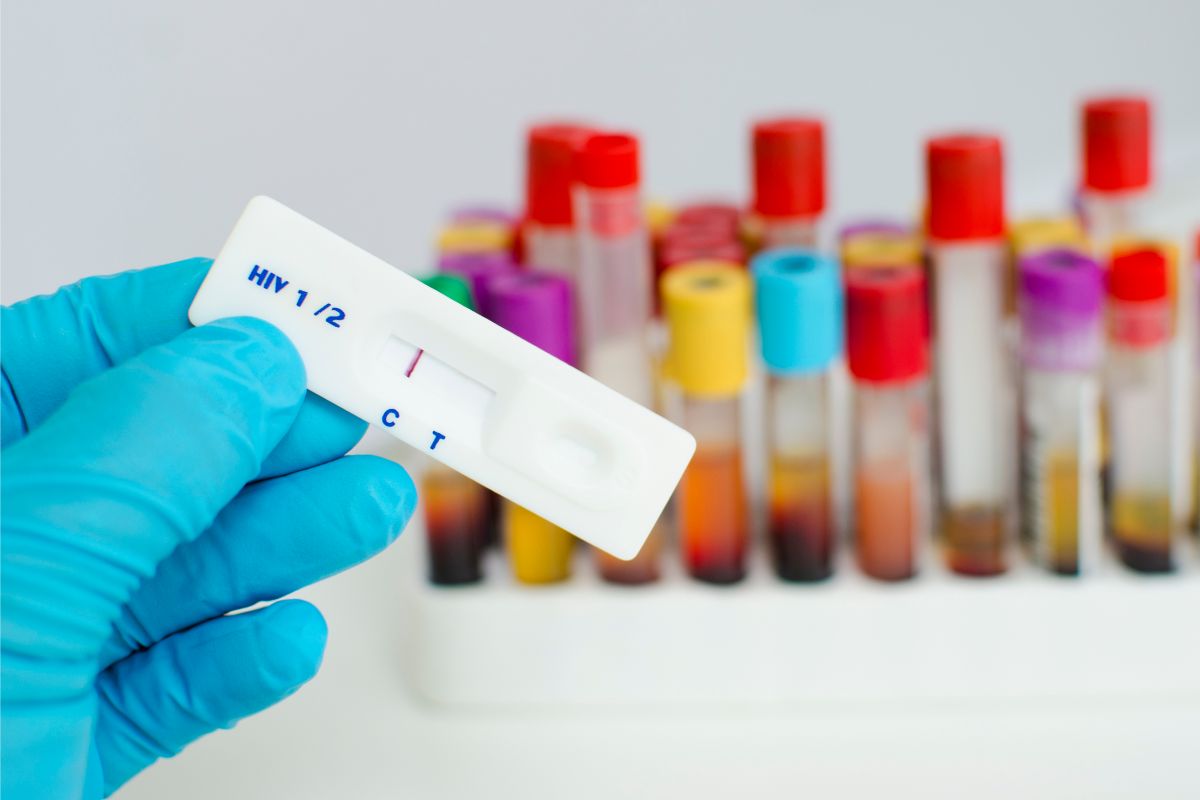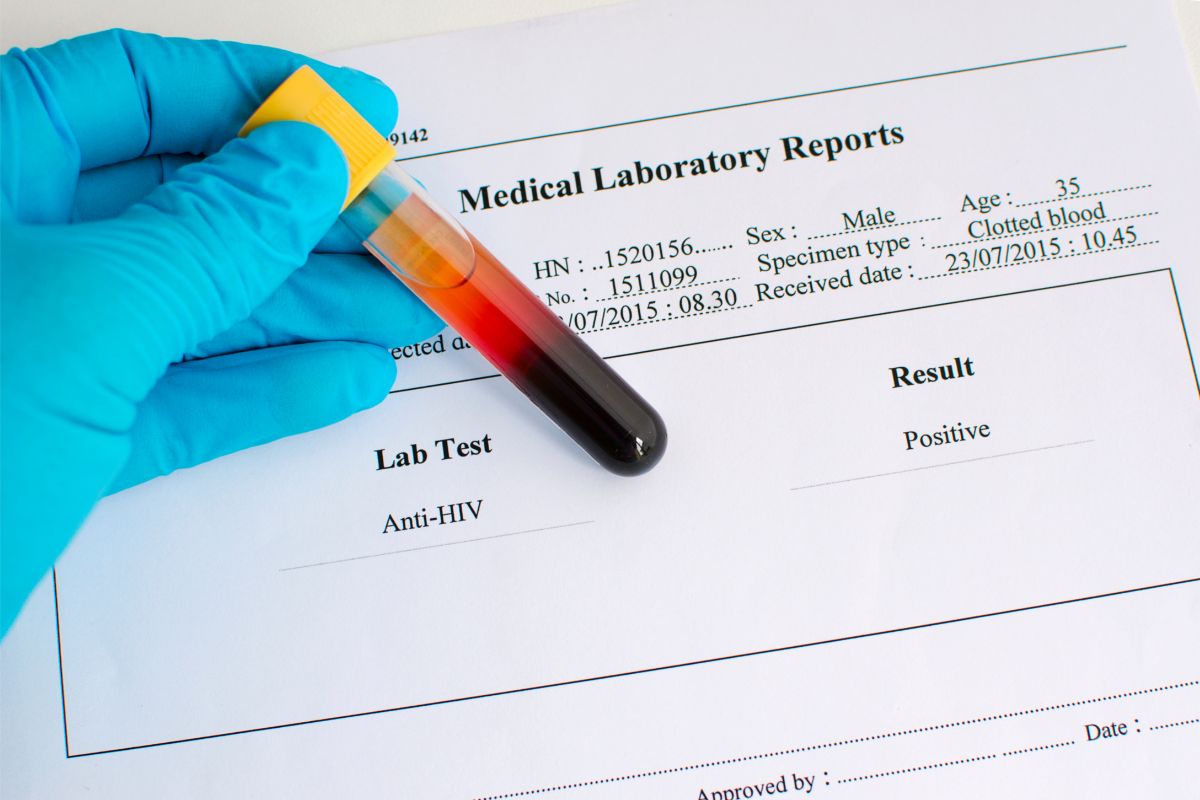HIV has been the cause of millions of deaths. People originally believed it was a sexually transmitted disease, but this is not the only way it can be transmitted.
It can be sexually transmitted, but it can also be transmitted via pregnancy, breast milk, childbirth, intravenous drug use with an unsterilized needle, and even blood transfusions.

There are a lot of stigmas that still surround HIV (see also ‘HIV1 And HIV2: What’s The Difference?‘) and its transmission today, but because it’s been better researched and explained, HIV is not as feared and it is extremely more manageable to live with in the present day.
There are 4 stages of HIV Progression… but what exactly are they? Read on to find out all you need to know about the 4 stages.
What Is HIV?
HIV (human immunodeficiency virus) is a virus that targets, attacks and damages the cells found in your immune system.
HIV weakens your immune system, making fighting off every day infections and diseases extremely hard.
When HIV progresses far enough, it becomes AIDS (acquired immune deficiency syndrome).
AIDS is an umbrella term used to describe a number of potentially life-threatening illnesses and infections that are caused by the damage to your immune system from HIV (see also ‘AIDS VS HIV: Key Differences To Understand‘).
HIV (see also our article on Perinatal HIV) is transmittable in most cases between people, whereas AIDS is not.
Though there is no cure for HIV at this current time, there are very effective drug treatments available that enable the vast majority of people living with HIV to have long, fulfilled lives.
If you have an earlier diagnosis and the correct and effective treatments, you can catch HIV well before it progresses into AIDS and you can avoid it progressing to that stage at all.
What Are The 4 Stages Of HIV Progression?
There are 4 stages of the HIV progression and they are as follows:
- Stage 1: Infection
- Stage 2: Asymptomatic
- Stage 3: Symptomatic
- Stage 4: AIDS/Progression From HIV to AIDS
Stage 1: Infection
Once HIV has entered the body, it replicates very quickly. Some of the symptoms of Stage 1 include short-term flu symptoms, such as headaches, fever, a sore throat, and usually a rash that appears within a few days or weeks after the initial infection.
During Stage 1, the immune system reacts to the virus and tries to fight it off with antibodies. This is referred to as ‘seroconversion’.
Stage 2: Asymptomatic
HIV usually does not cause any outward signs or symptoms (see also ‘What Are the Early Signs Of HIV?‘). For a long time after infection, you may not even know you have the HIV virus because you’ll remain asymptomatic.
Though you may appear healthy and well, during Stage 2, your immune system will be declining at a steady rate because the HIV virus will be deteriorating.
Stage 2 can last for several years, the average for this stage is actually 8 to 10 years.
Most people in this stage don’t even know they have the HIV virus unless they’ve recently been tested.

Stage 3: Symptomatic
When the immune system has deteriorated enough due to the HIV infection, symptoms begin to develop. This is where Stage 3 begins.
Symptoms start off mild, but they quickly develop into more serious conditions, such as weight loss, fatigue, mouth ulcers, thrust, and severe diarrhoea.
These symptoms develop due to opportunistic infections.
They are called opportunistic infections because they take advantage of the person’s weakened immune system. Some examples of opportunistic infections include toxoplasmosis, kaposi sarcoma, tuberculosis, and PCP.
Stage 4: AIDS/Progression Of HIV To AIDS
Once Stage 3 progresses and the person has had no treatment, the HIV virus develops further and becomes AIDS.
AIDS is unfortunately incurable and treatment is undeveloped. People who develop AIDS usually die relevively quickly afterward. It depends purely on the person’s overall health.
Though the HIV infection is divided into 4 stages, not everyone who is infected with HIV progresses to AIDS.
Most who don’t have had medical intervention, but there are some cases where HIV infected people naturally avoid it developing AIDS. These people are usually referred to as ‘long-term non-progressors.
The ‘long-term non-progressors have been a huge subject of research, with medical professionals studying them in hopes to understand how to beat AIDS.
Living With HIV
Though HIV used to be incredibly stigmatized, it is far more understood by people today.
Because of the advancements in science and the medical field, people who do have the virus can now live long and full lives, even with an HIV-positive diagnosis.
Without treatment, the HIV virus will progress a lot more rapidly than with treatment.
So if you know or think you might have the virus, it’s in your best interest to get tested and enroll in one of the treatment programs available.
You are also encouraged to stop smoking, have regular flu jabs (so at least once a year), change your diet to a healthy one, and have as much regular exercise as you can.
The progression of the HIV virus depends largely on your overall health and lifestyle outside of the virus, so if you make other aspects of your life more healthy, along with the right treatment, the HIV virus can be a lot more manageable and you can still live a full life.
Conclusion
Though HIV and AIDS are two devastating viruses and infections, there is hope for those who do get infected with it.
Medical science has progressed and evolved extremely rapidly. This once unknown and terrifying virus is now way more understood than it originally was.
There are many effective treatments HIV-positive people can use to prolong their lives and stop the HIV virus from progressing into AIDS now.
It is important for anyone who thinks they might have HIV to get tested as soon as possible. Even if you’re not 100% sure, it’s better to test and be safe.
Though HIV is better understood in the present day, there is still much ongoing research being done into both it and AIDS, in hopes that one day, the HIV virus will no longer be any form of threat to human beings.
- Understanding Male Reproductive Health: A Complete Guide - February 2, 2025
- Simple Healthy Skin Habits for Radiant Skin - December 6, 2024
- Unlocking the Connection Between Nutrition and Mental Health - December 3, 2024








![Prenatal HIV Transmission What Is Perinatal Hiv And When Does It Occur? [Explained]](https://alphanutrition.com/wp-content/uploads/2022/08/What-Is-Perinatal-Hiv-And-When-Does-It-Occur-Explained-150x150.jpg)